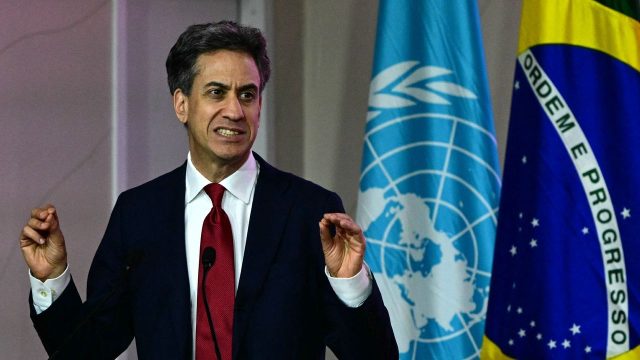
As he arrived in Belém, Brazil, this month for Cop30, Energy Secretary Ed Miliband sought to downplay the impression of a fraying international consensus on climate action. The “action and the atmosphere” at the summit “in my view, already demonstrates that the doubters are wrong”, he said.
Although the outcome of the summit remains unclear, with delegates divided on whether to commit to a “road map” for phasing out fossil fuels, Miliband has doubled down on Britain’s commitment to tackling global warming. But the actions behind the government’s words paint a more complicated picture.
What did the commentators say?
Keir Starmer arrived in Brazil “armed with undeniable climate credentials”, said Politico’s Charlie Cooper. His government remains committed to achieving net zero by 2050, opening up clear water with the Conservatives who recently joined Reform in calling for the target to be scrapped. It can point to successes in reducing carbon emissions and promoting renewables, with a target of clean power meeting 95% of Britain’s energy demand by 2030, as well as the promise of hundreds of thousands of new green energy jobs.
At the same time, international aid spending which supports the UK’s global climate objectives has been slashed, ministers are exploring watering down a pledge to ban new licences for oil and gas exploration in the North Sea, and the Treasury is looking at easing the tax burden for fossil fuel companies. These contrasting policy positions “neatly capture the Starmer approach to climate action”, said Cooper. “If it suits the domestic economic and political agenda, great. If not, then there is no guarantee of No. 10 and Treasury support.”
The reality is that “far from leading the world on the path of righteousness, the UK is an example of how not to do energy and climate policy”, said Dieter Helm, professor of economic policy at the University of Oxford, in The Times. While UK territorial carbon emissions have been coming down, this “reflects more the transformation of the British economy, and not in a good way”. “Britain is a leader in deindustrialisation in Europe”, and much of its green energy industry relies on imports from China, who burn half the world’s coal.
Rather than inspiring the world to follow Britain’s example on climate, Starmer is “setting an example in nothing except how to ruin your economy and impoverish your people”, said The Sun.
What next?
Reform UK has launched an all-out war on what its deputy leader, Richard Tice, has called “net stupid zero”, pledging to tax solar farms and rip up green energy contracts if it wins power. The “challenge” for Miliband and his allies “will be to show that his mission is a net benefit, not a net cost”, said James Heale in The Spectator. As the economy becomes “less of a dividing line in British politics” energy policy “might take its place”.
The UK’s net-zero consensus has “broken down”, said Helm in The Times. Miliband and Starmer should “stop boasting of world leadership, stop claiming to be creating a ‘clean energy superpower’” and “face up to the facts”. The current net-zero agenda is not convincing the public or mitigating global warming: Miliband must “stop digging an ever-deeper energy policy hole”. What we need is “honesty” that meaningful decarbonisation “really costs”.
Labour has shown leadership in the face of fraying international consensus, but must show the public their green mission is ‘a net benefit, not a net cost’





